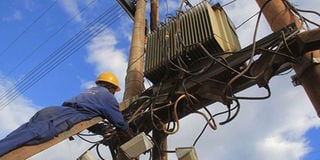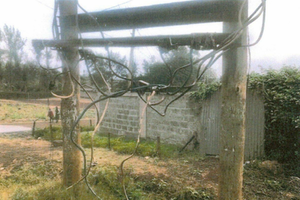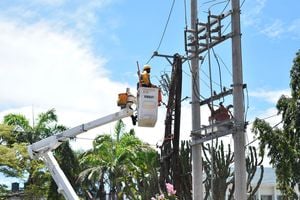
In this file picture, a Kenya Power worker fixes a transformer in Nyeri town.
At the confluence of Kamiti Road and the Thika superhighway in Roysambu, Nairobi, lies a small piece of land.
The triangle-shaped parcel, which is protected by a high perimeter wall topped by an electric fence, is strewn with countless transformers that have piled there for years.
In December 2021, then Energy Cabinet Secretary Monica Juma said the yard was packed with 10,000 faulty transformers.
The story of how those transformers ended up there is also the story of how corruption involving top officials at the power distribution monopoly continues to drown Kenyans in high power bills.
Kenya Power procures equipment worth billions of shillings each year. It is therefore little surprise that the process has remained at the centre of most of the major scandals that have rocked the firm over the years.
One of the highest profile of these cases was in 2018, when then managing director Ben Chumo was arrested and charged alongside 10 other suspects over the purchase of hundreds of faulty transformers worth Sh400 million between June and August 2012.
In October 2022, the charges against Mr Chumo and his co-accused were dropped after the police failed to conduct further investigations to strengthen the prosecution’s case.
Last year, the firm bought thousands of new meters worth more than Sh1.25 billion from Chinese suppliers despite the equipment failing its own quality tests.
Firms fight tooth and nail to get a slice of Kenya Power’s lucrative tenders. Kenya Power Managing Director Joseph Siror told Nation that the firm has been struggling to buy equipment due to court cases challenging the tenders.
“Until September last year, there were no material coming into the company. Over that one-year period, there were about six major litigations which were raised which touched on the most critical equipment; meters and transformers,” said Dr Siror.
The Kenya Power boss said that, while the utility company eventually won the cases, they had already delayed the procurement of the equipment, compounding the shortage of meters and transformers.
But it is the procurement of electricity from independent power producers (IPPs) that has remained as opaque as ever, leading to high capacity charges and tariffs being loaded onto consumers.
What this means is that the public does not readily know the criteria that is used to select IPPs, how the technology to be used to generate the power is selected or even how the price of the power is arrived at.
MPs were in 2022 puzzled to learn that in some of the instances, it is the IPPs that approach Kenya Power with their proposals to build expensive power plants, which are hurriedly approved by the company and government officials.
Attempts to reform procurement processes at the company appear to have yielded little results.
Many of the faulty transformers frequently explode, leading to power outages that sometimes last months.
After a transformer explodes, Kenya Power officials usually arrive to cart it away to its repair stations, which have been established in Nairobi, Mombasa and Kisumu.
Once there, the process of trying to bring the expensive equipment back to life starts.









